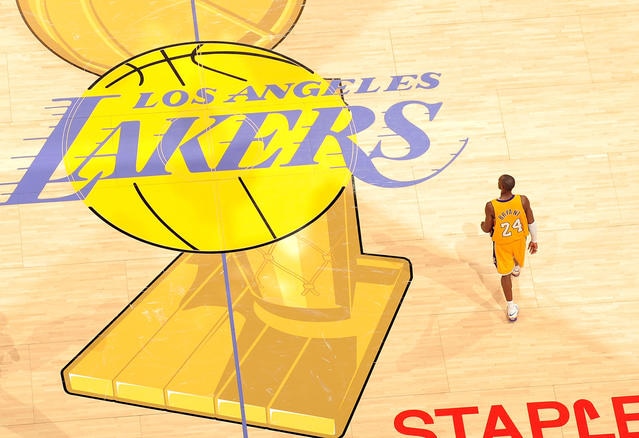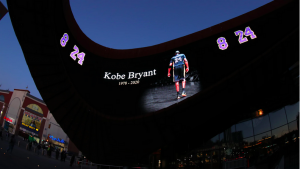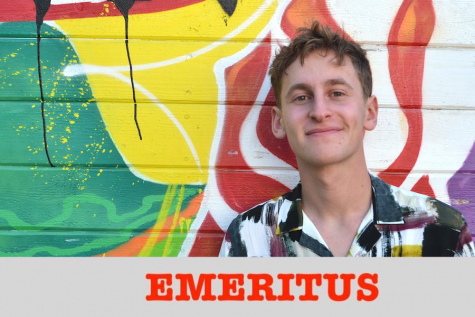We can hold two ideas at once
SHOCK: Kobe Bryant and eight other people, including his daughter Gianna, died in a helicopter crash Sunday morning
January 28, 2020
I’ve felt a lot of things over the past few days. I was at first shocked, in complete denial that something could happen to someone I felt almost familiar with. Kobe existed when I was born and throughout my life until now. Living in LA it felt like you were under his domain. He was such an incredible force to watch and he made sports seem like they were more than just a game, it felt like life or death. It’s so rare that anyone in any profession is able to make their work feel that powerful.
After the shock subsided and I started to imagine a world without Kobe, my stomach ached and felt like it was being pulled from so many different directions. I thought of all my friends, for whom Kobe was everything. He was their role model, the captivating and foundational force of their childhood. Losing Kobe was not just a shock out of some weird alternate dimension, it was ripping away a part of who they were. I could never come close to feeling this pain, as Kobe simply wasn’t that in my life. And I want everyone who feels this way to know that I deeply respect your feelings and wish I didn’t have to bring up something which hurts you.
But I can’t willfully ignore that there was a credible rape allegation against this man. Had it been someone with less of a devoted following, maybe the whole dynamic would be different: maybe we wouldn’t feel conflicted about bringing up the topic of whether this man benefitted from a culture where rape victims are silenced. But it wasn’t a random person who died in a helicopter crash Sunday; it was Kobe Bryant. It is unfair to ask people to separate the Kobe who was everything to them from the Kobe who was a flawed man.
And so I have to ask that we hold two conflicting ideas in our heads at once. One: that any death is awful. And it is especially horrific that such a loved man would be taken from the world with his daughter, who he cared for more than anything, at his side, and that his wife and the rest of his children must be destroyed. And two: that there is a culture of turning a deaf ear to rape victims. For any survivor of rape to experience endless praise of their rapist must be a hellish experience. And while, yes, this case does not have the assuring stamp of a conviction, that does not mean that the woman who accused Kobe did not suffer immense pain and hurt. The legal system makes it inherently difficult for reporters of rape to win cases against their assaulter. Imagine going up against Kobe Bryant before #metoo.
People who say that the praise of Kobe’s life makes them uncomfortable should not be looked at as unnecessarily disparaging the dead. When anyone close to the fame of Kobe passes away, their entire lives are examined. In the showers of praise for Kobe’s accomplishments that don’t mention the uncomfortable evidence that he himself acknowledged, we are affirming as a society that we will always take the side of the powerful and adored, human and fallible though they are.
Feeling raw and pained right now is more than a valid response. And hearing something hurtful about someone who was taken from you so brutally quickly and painfully must feel like a gut punch to an already sensitive area. But we must acknowledge that our heroes are more complicated than we’d like to believe. You cannot forget the real Kobe in favor of his fictionalized persona which you would rather remember. Now might feel like the wrong time, but there is no better time to examine the fallibility of role models and foundational figures, so that we can make a safer world.


















Tom Mueller, The Kirkwood Call, Kirkwood High School, Atlanta • Jan 31, 2020 at 12:25 pm
Nice.
Asher Dauer, Shalhevet '19, Jerusalem • Jan 31, 2020 at 6:13 am
While there is certainly validity in recognizing the “real Kobe,” there’s a time and place to do so. I’m all for pointing out that Kobe wasn’t a perfect human being – he made mistakes, just like everyone else. However, the few days following his tragic passing is not a time to point out a deceased man’s faults. When someone gives a eulogy or discusses the life of someone close to them who passed very recently, it’s common sense to commemorate their merits and honor their life. The fact that Kobe was a celebrity doesn’t change what should be common sense – honoring the dead. Although I think it may have been too early to write this article, I appreciate that JJLB acknowledged that this is a complicated issue. He addressed the accusations in a nuanced way and while pointing out that Kobe had faults, Jacob still recognized that he matured after the incident, was a role model to many, and the accident was a horrific tragedy. So ultimately, while the article is pushing its boundaries in terms of timing, props to the author for encapsulating all angles fairly.